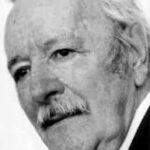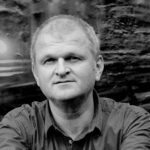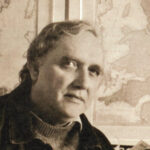Montenegro
 Sreten Asanović was born on 22 February 1931 in Donji Kokoti, near Podgorica.
Sreten Asanović was born on 22 February 1931 in Donji Kokoti, near Podgorica.
He was the author of a collection of stories Dugi trenuci (1956), Ne gledaj u sunce (1960), Igra vatrom (1966), Lijepa smrt (1971), Opojno piće (1977), Noć na golom brdu (1980), Lice kao zemlja (1988), Martiri i pelegrini (2000), Nomina (2006), Zvijezde padaju (2009), Kratke priče (2015) and a novel Putnik (1994). He has prepared for printing the selection of short stories of Camil Sijaric, Sablja (1969), and, in cooperation with Čedo Vuković, the selection of Montenegrin memoirs Svjedočenja (1978). Some of his stories have been translated into more than twenty languages.
He received numerous awards, including the Prize of the Writers Association of Montenegro (1957), the July 13th Award (1972), the Goran’s Award for the Best Book of the Year written in the Serbo-Croatian language for Noć na golom brdu (1981)…
He was the President of the Association of Writers of Montenegro (1973-1976) and of the Union of Writers of Yugoslavia (1980-1981). He was a member of the Duklja Academy of Sciences and Arts and the Montenegrin Academy of Sciences and Arts.
He died on 3 June 2016 in Podgorica.
Recognizable even in the Yugoslav frameworks as a master of short stories, with his only novel Putnik – The Traveller, Sreten Asanović enriched the Montenegrin novelistic production with the text made in the best tradition of the picaresque novel.
Narrated in the first person, as an autobiographical statement of the main character, the novel Putnik follows the fulfilling life of Božo Živkov Tomović, who in his early age started travelling from Donji Kokoti into the world, reaching Hungary, North and South America, France and Spain, always accompanied by “local” persons and concerns. Finally, at the beginning of World War II, he settles down in Montenegro. In two chronological wholes, “Đetinjstvo i mladost” and “Zaludnja zrelost”, in 40 short chapters, Asanović presents an authentic biography of his literary hero, in the period from 1888 to 1939, imbued with the quest for a better life, wars, politics, roads and byways, which are made unusual from a perspective and dealt with a slightly ironic tone, mark a stormy period in the history of Božo’s homeland and its people.
“But it looks like that the troubles do not end with the childhood, but are only then emerging, because a child from our regions, as soon as he starts crawling over the threshold, must fight and bite if he intends to live and not be pushed down by other children and make him a pitiful man; and thus he lives until his death, always being in a state of ‘who will win’.”

Husein Bašić was born on 1 February 1938 in Brezovice, near Plav.
He published collections of poetry Od sunca ogrlica (1970), Bestražje (1972), Prošle noći (1974), Utra (1979), Jato u nevidjelu (1980), Breme (1986), Uzma (1986), Glasovi s vode (1987), Kad su gorjele Božije kuće (1994) and Čuma (1997), books of stories Neviđena zemlja (1973), Trpija (1984) and Vjetar s Prokletija (1985), novels Tuđe gnijezdo (1980), Krivice I and Krivice II (1986), Kolovrat (1993), Crnoturci (1996), Pusta vrata – Krivice III (1998) and a cycle of novels Zamjene 1−5 (Tuđe gnijezdo, Kapija bez ključa, Kosti i vrane, Pusto tursko and Bijeli Azijati) (2000).
He received numerous awards including the “Isak Samokovlija” Award (1973), the July 13th Award (1981), the Charter of Kulin Ban (2005)… He was included in numerous anthologies of Montenegrin and Bosnian literature.
He was the President of the Writers Association of Montenegro and the member of the Montenegrin PEN Centre, the Montenegrin Society of Independent Writers and the Duklja Academy of Sciences and Arts.
He died in Podgorica on 3 November 2007.
The novel Crnoturci of Husein Bašić deals with one of the ancient themes of world literature – the exodus. But the exodus that is the subject of Bašić’s interest is not burdened with a mythological aura of a biblical prototext but is focused on a particular episode of the Montenegrin history of the end of the 19th century – departure of Nikšić Muslims from their homes after the “fall of Nikšić”, i.e. its merger to the Montenegrin state in 1877.
In the changed geopolitical circumstances, the Muslims of Nikšić embark on a long, uncertain journey into the mythical land of Karabakh. Two brothers, Jašar and Jakub Kuč, leave a choice of who will go and who will return to fortune. Pulling a longer straw, Jakub Kuč, with his family, continues his journey. The novel Crnoturci actually represents a painful chronicle of a refugee being abroad, between dream and reality, his journey from his native threshold into the unknown. In the manner of a skilled storyteller, Bašić recounts an ancient story about the departure and the uncertain fate of the refugees who leave behind the graves, a whole world, culture and identity, which disappear with their departure.
“What is a poor human creature in this side of the world? A snail on a way that is not its own, a bird on the branch that is not its own. He has no time to look at what he leaves behind, and he has already stepped into someone else’s. That is the first step of a refugee, the shortest one, but the one giving the bitterest of pain. Afterwards it is followed by losing oneself and the darkness.”

Balša Brković was born on 25 September 1966 in Podgorica.
He published the books of poetry Konji jedu breskve (1985), Filip boje srebra (1991), Rt Svete Marije (1993), Contrapposto (1998) and Dvojenje (2001), a book of stories Berlinski krug (2008), and the novels Privatna galerija (2002), Paranoja u Podgorici (2010) and Plaža Imelde Markos (2013). He was engaged in literary and theatre criticism, as well as the essays’ writing. His work has been translated into several languages.
For the novel Privatna galerija, he was awarded the Miroslavljevo Jevanđelje Award in 2004.
Privatna galerija – Private Gallery by Balsa Brkovic signaled an emergence of a generation of Montenegrin writers of a new sensibility, aimed at questioning traditional model of fiction writing and thinking, and facing the poetic paradigms of contemporary literature.
The main character and narrator in Privatna galerija, Bartholomew Baki Braunović, is the editor of the local newspaper and a cynical chronicler of the end of the millennium. Ten stories and the epilogue of Privatna galerija construct a kind of urban mythology of new Podgorica. The gallery of characters of this roman à clef makes a cross section of the world in transition, which, through anecdotal episodes seasoned with narrator’s discursive passages and long intellectual dialogues, saturated with numerous quotes, is populated by the artists, shady characters, the city’s faces, fathers and children and mystifying persons of various types. In the new transitional jungle of new Podgorica, accompanied by his brother Kuzma, Baki develops a business worthy of inauthentic time which they live in – for a new class they forge non-existent images, the ones that owe their existence to literary texts.
“All moments are present in each moment, I think. Both the future and the past doze at each moment of our existence. Whatever I do, I know that I will not change the Order.”

Zuvdija Hodžić was born on 1 August 1943 in Gusinje. He graduated at the Faculty of Philology in Priština.
He published a book of poetry Na prvom konaku (1970), a collection of short stories Gluva zvona (1973) and Neko zove (2003), novels Gusinjska godina (1976) and Davidova zvijezda (1993), a book of travel writings and reportages Jedan dan života (1995), a book of essays To je to (2013) and a monograph of drawings and notes Podgoricom starom (1999) and Otkrivanje zavičaja: crteži Plava i Gusinja (2003).
He has received numerous awards and honors, including the July 13th Award (2005), thre Award “Pero Camila Sijarica” (2011), the award “Stefan Mitrov Ljubiša” (2015)…
His literary work was translated into several foreign languages and is presented in numerous anthologies of Montenegrin and Bosnian literature.
He is the Secretary-General of the Montenegrin PEN Centre, member of the Duklja Academy of Sciences and Arts and an associate member of the Montenegrin Academy of Sciences and Arts.
The novel Davidova zvijezda – The Star of David written by Zuvdija Hodžić brought to the Montenegrin literature a spirit of oriental storytelling, incorporated in the model of postmodernist historiography meta-fiction. These two narrative models form a peculiar narrative process, based on the fragmentary narrative threads unified by the universal theme of human destiny at the border of different worlds, civilizations and eras.
The main character of the novel, David Šahan, a chronicler of the border who puts together the parts of biography of a Jewish mystic of the 19th century Šabetaj Cvijo, whose life ended in Ulcinj. Reconstructing the fate of Šabetaj Cvijo, and reviving the numerous episodes of life on the border and moving along the narrative broad stage from Prokletije to Baghdad, he encounters the history embodied in a traumatic historical episode of the Informbiro Resolution and its consequences for the lives of people from the border. The Hodžić’s novel, assimilating a diverse narrative traditions, gets close to the poetics of magical realism and thus, as a rare achievement of the contemporary Montenegrin literature, blends into the recent trends of world literature.
“Gone are the empires and cities, caliphs and emperors. A story has remained, stronger and more durable than the hard buildings and mighty hordes, which made the soil hiss as a military trumpet.”

Pavle Jovanović was born on 15 March 1947 in Belgrade.
He was a Professor at the Law Faculty of the University of Novi Sad, and a visiting professor of the Law Faculty and the Faculty of Political Science of the University of Montenegro in Podgorica.
He published more than seventy articles and studies in the field of political science and sociology. Published books: Dva ogleda s državom (1983, Beograd), Savremeni politički sistemi (co-authors: Nenad Dimitrijević and Milan Popović, 1998, Podgorica), Neke odlike političke kulture u Crnoj Gori (co-author: Miloš Marjanović, 2001, Podgorica), Tranzicionizam – Refleksije o postkomunističkoj tranziciji (2006, Podgorica, Zagreb). He also worked on translations. He translated from English: Reflections on the French Revolution by Edmund Burke (2001, Podgorica) and Constitutional democracy by Karl J. Friedrich (2005, Podgorica).
Ever since 1963, under a pseudonym, he published poems and short stories. The only novel that was published during his life was Put u Karadag (2003, Podgorica).
He died in Belgrade on 3 September 2008.
The only published novel by Pavle Jovanović, Put u Karadag – The Way to Karadag, belongs to the works of great narrative power and artistic value.
Written as a roman-fleuve, Put u Karadag consists of four independent novels following four generations of Montenegrin family Bogišić from Orlica. Through four books and the fate of the four protagonists, Okiča’s Beso, Bešo’s Djurdjo, Djurdjo’s Jagoš and Jagoš’s Oleg, from the end of the 19th until the end of the 20th century, an image of the historical destiny of one Montenegrin family during the 20th century is portrayed. Modest in style, without broad digressions and descriptions, this novel is written in a linear manner of a family chronicle, with a combination of reporter narration and short dialogues, which contributes to an effect of estrangement and avoids the overly emotional narrative. Although situated in a concrete and recognizable historical frame, Put u Karadag has a strong humanistic dimension, outlining the history only as a backdrop of a narrative with a man, his homeland and his destiny at its centre.
“I was confused by this world, he concluded. It left me on this fernery, to guard this hell of a bridge, to count the days which no one asked me for, and no one noted what those will bring, to wait patiently for the old ages, as patiently as everything that is sidelined or dead.”

Mirko Kovač was born on 26 December 1938 in Petrovići (Nikšić).
He published the novels Gubilište (1962), Moja sestra Elida (1965), Životopis Malvine Trifković (1971), Ruganje s dušom (1976), Vrata od utrobe (1978), Uvod u drugi život (1983), Kristalne rešetke (1995), Grad u zrcalu (2007) and Vrijeme koje se udaljava (2013), the books of stories Rane Luke Meštrevića (1971), Nebeski zaručnici (1987), Na odru (1996), Ruže za Nives Koen (2010) and Malvina i druge priče (2012). He published several books of essays, drama, letters and memoirs. He wrote plays, TV dramas and screenplays.
He received numerous awards, including the NIN Award (1978), the Andrić Award (1979), the Tucholsky Award (1993), the Herder Prize (2007), the “Meša Selimović” Award (2007), the “Vladimir Nazor” Award (2007), the 13th July Award (2008), the Njegoš Award (2009), the Kiklop Award (2012)…
He was a member of the Duklja Academy of Sciences and Arts and the Montenegrin Academy of Sciences and Arts.
He died on 19 August 2013 in Rovinj.
In his last completed novel, Grad u zrcalu – A City in the Mirror, the great master of storytelling, Mirko Kovač turned to the sources of his narrative adventure: the past, family and homeland.
The mythical town of L., on the historical and geographical border of the worlds, in the triangle between Nikšić, Trebinje and Dubrovnik, is an area where the memories of childhood and family stories that took place during the entire 20th century are revived by the narrator of the novel Grad u zrcalu. As a lyrically intoned family chronicle, this novel is, at the same time, a literary convincing testimony of space and time and a complex story about family relationships, and, above all, a melancholic recap of a lifetime and artistic experience and, as the author said, “the funeral of one of the worlds”. Through 65 narrative micro-units which can figure also as independent texts, Kovač, in a manner of chronicles, conjures up a world of a border and growing up, shown through a subjective filter of narrator’s memories and enriched by lucid intimate insights of a skilled chronicler.
“If there were no misses, what would we be? The lucky ones? I am going to tell you honestly, I am a lucky one, but the lucky one whose life is just a series of misfortunes, perfect futility, to which I am happily humming along.”

Mihailo Lalić was born on 7 October 1914 in Trepča, near Andrijevica.
He published a collection of poems Staze slobode (1948), collections of short stories Izvidnica (1948), Prvi snijeg (1951) and Posljednje brdo (1970), novels Svadba (1950), Zlo proljeće (1953), Raskid (1955), Lelejska gora (1957), Hajka (1960), Pramen tame (1970), Ratna sreća (1973), Zatočnici (1976), Dokle gora zazeleni (1982), Gledajući dolje na drumove (1985), Odlučan čovjek (1990) and Tamara (1992), a book of travel writings and reportages Usput zapisano (1952) and several books of essays and diary entries.
He received many awards and honours for his literary work, including the distinguished Award of the Union of Writers of Yugoslavia (1954), the Award of the Association of Writers of Serbia (1955), the Njegoš Award (1963), the AVNOJ Award (1967), the 13th July Awards (1968, 1970 and 1974); the NIN’s Award (1974), the Goran’s Award (1982).
He was a member of the Montenegrin Academy of Sciences and Arts and Serbian Academy of Sciences and Arts.
He died in Belgrade, on 30 December 1992.
The literary work of Mihailo Lalić, one of the most important Montenegrin novelists of the twentieth century, was almost entirely devoted to a thematization of World War II and the cruel fate of an individual in the time of evil. In his last novel, Tamara (1992), published just before he died, Lalić approached a theme of war in a new way, without an idealization, showing the other side of the National Liberation Movement, the great mechanism of the revolution that “devours its children”.
After a minor traffic accident in which he got hit in the head, a retired President of the court, Djuras Vukčić, began a new life, filled with long dialogues with the ghosts of the past. By living in a parallel world of imaginary court proceedings, during which a reverse side of revolution and war was revealed, Djuras made a mosaic of “guilt” and the mysterious death of a student Tamara Godačić, convinced to have betrayed the ideals of the revolution. A gallery of witnesses parading in Djuras’s consciousness and an imaginary courtroom is convincingly pictures the tragedy of war and its companions –human hatred, envy, vengeance and betrayal.
“It is easy to suffer a cursing, yelling, or kick of a jailer, because you know that he is a trained animal, but a man-traitor is – especially when he is aware of such a status – worse than any animal. Deprived of something biological – love for someone like yourself, belonging to the community, caring for posterity…”

Andrej Nikolaidis was born in 1974 in Sarajevo.
He is the author of the collections of stories Ogledi o ravnodušnosti (1994) and Katedrala u Sijetlu (1999), novels Zašto Mira Furlan (1996), Oni! (2001), Mimesis (2003), Sin (2006), Dolazak (2009), Odlaganje. Parezija (2012) and Devet (2014), and the book of essays Balkanska rapsodija (2007), Homo Sucker: poetika Apokalipse (2010) and Melanholija ljevice: smjena straže (2015).
His novels were published in 20 editions in various European languages, among others in English, German, Italian, Turkish… His prose is represented in the anthology Best European Fiction 2012.
For the novel Sin he won the European Union Prize for Literature in 2011, and for the novel Odlaganje. Parezija he was awarded the Miroslavljevo Jevanđelje Award in 2012.
Among the adherents of “the new Montenegrin literature”, Andrej Nikolaidis, with his entire literary and journalistic engagement, represents the most radical voice for the break with the bequeathed matrix, and his novels are a sobering “slaps in the face” to the petrified epic tradition.
The main character and the narrator of Mimesis, Konstantin Teofilis, an offshoot of the Montenegrin family of Greek origin, born in Sarajevo, living in the southernmost Montenegrin coastal town of Ulcinj, is a passive witness of inferno of 1990s. From his cynical but isolated perspective, Konstantin tells stories of himself and others, the family, environment, constraints of a hard macho, hypocritical and violent society, in both essayistically lucid and uncompromising, as well as factually direct and accurate manner. Without the strength to resist the galloping madness, with no will to solve his emotional problems by going out with his girlfriend, Teofilis remains stuck in space and time unfriendly to “the weak”, delaying the final decision and seeking refuge in the world of music and literature.
“One has to be careful what he brings into himself, be it alcohol or the world. Only a little, only of the best.”

Milorad Popović was born on 2 February 1957 in Lipa Cucka, Cetinje.
He published the books of poetry: Sa trga glodara (1982), So Jude (1983), Nema više klađenja (1985), Red se polako zavodi (1987), Cetinjski ljetopis (1991), Nesigurna zemlja (2005) and Raskršća (2008); the novels Karnera (2012) and Čovjek bez lica (2016), and the books of essays Mali narod i nacionalizam (1997), Crnogorsko pitanje (1999), Podijeljena nacija (2010), Njegoš i crnogorska nacija (2011) and Njegoševo nasljeđe (2013). His poetry and essays have been translated into several languages.
He received numerous awards for literature, including the “Risto Ratković” Award for the best book of poetry in the Bosnian, Croatian and Serbian language (2005), ” Miroslavljevo Jevanđelje” for the best book published in Montenegro 2005-2008, the “Meša Selimović” Award for the best novel in the language area of Bosnia and Herzegovina, Montenegro, Croatia and Serbia (2012) and the 13th July Award (2016).
He is the President of the Montenegrin Association of Independent Writers.
For decades active as a poet, writer and intellectual engaged on the literary scene, Milorad Popović imposed himself with a debut prose, the novel Karnera, as the authoritative voice of contemporary Montenegrin prose.
Although the title and the introductory chapters of the novel refer to the world of boxing, Karnera is thematically, least of all, a novel about boxing. Therefore, the story of a local boxer Trifun Tripković, who was cast away by life to the margin, is located on the margins of the text. Between the story about the Trifun’s origin and an early age, told in the third person in the first four chapters of the novel, and the news of his death in the epilogue, the narrator of the Karnera, a former boxer and the croupier, Mato Tujovćc, recounts a cross section of his own turbulent life experiences from the end of 1980s to the renewal of Montenegrin independence, returning occasionally to some of the crucial historical events of the 20th century. As much as a novel about outcasts and a destiny of a country, Karnera is the first novel with Cetinje, with his mighty mythical potential, in the very centre of the story.
“I have instinctively closed my eyes, and when I looked again, the lady in green high heels was gone. According to a telling of the old guardians, when the heavens are upsetting and the strong winds are hitting, the upset souls will make a timid man plastered and enraged.”

Dragan Radulović was born on 27 August 1969 in Cetinje.
He published a collection of short stories Petrifikacija (2001), a novel Auschwitz Café (2003), a directory of grotesques Vitezovi ništavila (2005), a collection of short stories Splav Meduze (2007) and drama Pejzaž do pakla or Propast kuće Marinkovića (2011). His work was translated into several languages and included in several anthologies of Montenegrin prose in the country and abroad.
He was awarded the “Stefan Mitrov Ljubiša” Award for literary creation in 2009.
He is the President of the Montenegrin Matica.
The Auschwitz Café by Dragan Radulović, in the subtitle designated as a dystopia, is in many ways distinct phenomenon of contemporary Montenegrin literature.
The action of Radulović’s dystopia takes place in Budva, in the immediate future, where a joint-stock company for production and distribution of agony “Scaffold” (Montenegrin original – Gubilište) at the Square of the Sentence (the former Square of the Book) is executing the political opponents and those who run afoul of the law, as a lesson to the public. The totalitarian world governed by the close cooperation of politics and corporations of neo-Nazis obsessed with the mission of virus production, with immigrants as guinea pigs, is a dark stage along which there move the protagonists of the novel, burdened with the traumas produced by the “surplus of history” of the Balkans. Paradoxically, both humanistic and alienating dimensions are embodied by the narrator – a crippled dog of ugly looks and gentle nature, Ždero. With a powerful allegorical subtext, Radulović’s novel actually examines the dark consequences of the abuse of power, politics and ideology.
“For some time now, I flatter myself that nothing can surprise me any more, that I saw everything that people can show, everything that they are ready to do. Nevertheless, it is still a flattery and self-deception. Because, people do surprise.”

Ognjen Spahić was born on March 14, 1977 in Podgorica.
He published the books of stories Sve to (2001), Zimska potraga (2007) and Puna glava radosti (2014), and the novels Hansenova djeca (2004) and Masalai (2015). His works have been translated into English, French, Czech, Greek, Turkish, Romanian, Italian, Bulgarian, Slovenian, Hungarian, Macedonian, Albanian and German.
For the novel Hansenova djeca, he won the “Meša Selimović” Award for the best novel published in Croatia, Serbia, Montenegro and Bosnia and Herzegovina in 2005. For the same novel he won an international literary award Ovid Festival Prize for the year 2011. For the book of stories Puna glava radosti, he was awarded the European Union Award for Literature. A short story Rejmond je mrtav. Karver je umro, rekoh was included in the annual anthology Best European Fiction 2011 published by Dalkey Archive Press from Chicago.
With the novel Hansenova djeca – Hansen’s Children, Ognjen Spahić positioned himself, in the context of the new Montenegrin literature, as a distinctive author, quickly gaining popularity outside of Montenegro and winning some valuable literary awards.
On the thematic level, Hansenova djeca represents a novel of the last European leprosarium, but placing the action in the southeastern Romania in the time immediately before and after the fall of Ceausescu, Spahić has clearly indicated the allegorical potential of his novelistic debut. Narrated in the first person, the novel takes the form of an intimate confession of an unnamed narrator who is also one of the inhabitants of the leprosarium. Far from being only a dull confession, the novel represents a complex, rich in style, convincing genre fiction and narratively powerful composition comprised of a series of reminiscences and stories about the disease and the patients, cut off from the world and situated inside a fenced area ruled by suffering, pain and the struggle for survival, of the plans to escape from the place of dehumanizing isolation and inevitable solitude.
“I always had the impression that our building and its immediate surroundings is rather perceived as a haunted graveyard teemed with spirits, than as a medical facility. This was, I believe, contributed to by the long linen robes, being the necessary protection from the sun and the views of patients.”

Čedo Vulević was born on 8 May 1927 in Trešnjevo, near Andrijevica.
He published the novels Povratak predaka (1974), Dušmani (1980), Vanredna linija (1990), Makarije ot Črnie Gori (1994) and Ogrtač boje mirte (2001), and the books of stories Bertine partiture (2004), Prtljag snova (2005) and Nalet bočnih vjetrova (2007). He wrote screenplays for feature films and documentaries and performed management duties in publishing (“Obod” Cetinje) and film companies (“Lovćen film” Budva and “Film studio” Titograd).
His first novel, Povratak predaka, was prohibited by the court and destroyed. He received the 13th July Award in 1991 for the novel Vanredna linija.
He was a member of the Montenegrin Matica, the Montenegrin PEN Centre, the Montenegrin Society of Independent Writers and the Duklja Academy of Sciences and Arts.
He died in Trešnjevo, on 11 July 2006.
In his last novel, Ogrtač boje mirte – A Myrtle-Coloured Robe, Čedo Vulević sublimated thematic preoccupations and stylistic trends that have marked his entire novelistic opus.
The action of the novel Ogrtač boje mirte mostly takes place in the room 23 of a psychiatric hospital of an imaginary seaside town Dubrave and its immediate surroundings. Although temporally and spatially tightly limited, with only a few protagonists, the plot of the novel extends through manuscripts and visions, the inserts of (pseudo) historical narratives of the characters and reminiscences of their previous lives, reaching the mythical tradition of antiquity, Montenegrin historical junctions and the testimony of disintegration of Yugoslavia. The central character of the novel, writer Vladimir Šćepanović, came to the psychiatric hospital due to the police order after he was banned and burned the novel about the camp experience. The weird world of the room 23, inhabited with hallucinations and dreams, is a kind of metonymy of the world outside the walls of the hospital in Dubrave, the world marked by cyclical movement of time, persecutions, suffering and destruction.
“Everything has its own flow and bequeathed transience: day in and day out. In between stands a sort of a poor man’s haven, or its fascination. Everything is surrounded by a wall that man carries within.”
NORTH MACEDONIA

Venko Andonovski, short story writer, novelist, playwright, poet, essayist, literary critic and theoretician. Born in Kumanovo on 30 May 1964. Graduated from the Faculty of Philology in Skopje. PhD in Philology. Professor at the Blaže Koneski Faculty of Philology in Skopje. He is the author of the following books: The Barbarian’s Tender Heart (poetry 1986), The Lyric Poets’ Quarter (Short stories, 1989), Frescoes and Grotesques (short stories 1993), Alphabet of the Insubordinate (novel, 1993), Text Processes (essays, 1996) Matosh’s Bells (study, 1996), Structure of the Macedonian Realistic Novel (study, 1997), Three Plays – Slavic Chest , Mutiny in the Old People’s Home, Hades Machine (1998), Decodings (2000), Navel of the World (2001), Kitsch Mythologies (collection of newspaper articles, 2001), Dark Dolls (play, 2002)
Awards include: ”Racinovo priznanie”, first prize for best novel by the Zumpres Publishing House, an award for best drama text at the “Vojdan Černodrinski” Festival in Prilep, “Novel of the Year award”, and “Balkanika”.
The novel Azbuka za neposlušne – Alphabet of the Insubordinate is characterised by an unusual organization and structure: the action takes place in an alphabetical order and following the deeper layers of the transformation of letters, starting from their source in the similarity between the object and the notion to which they refer and leading to their ultimate simplification and abstract nature. Alphabet Of The Insubordinate is triggered by the complete compatibility between the notion and the content it expresses in actual life and reality on one hand, and by its reflection in the alphabet and in writing on the other. It is an exciting fairy tale of the desire for purity and perfection, as well as a drama of a person overcome by all-encompassing vanity. Being conveyed entirely by hunches, riddles and paraboles, this novel is actually a great parabole and a praise to firmness and to resistance to the temptations of the evil by which man is constantly surrounded.
“And don’t be afraid when you write, let the soul get into your fingers; then you shall see the true form of things; because the letters are pictures and this is how it has always been.”

Petre M. Andreevski (1934-2006), poet, novelist, short story writer, playwright. Member of the Macedonian Academy of Sciences and Arts since May 2000. He published the following books of poetry: Knots (1960), Both on Heaven and Earth (1962), Denicija (1968), Dalni nakovalni (1971), Praises and Complaints (1975), Eternal House (1987); Lachrymatory (1999). His books of short stories include: The Seventh Day (1994), Years of Treason (1974), All Faces of Death (1994). Published novels: Weed (1980), Locusts (1983) Nebeska Timjanovna (1988) and Last Villagers (1987). The book Plays (1987) includes Time for Singing and Bogunemili. He also wrote two books for children: Scribble Riddle, Eat and Grow. Several selections of his literary opus were published. In 1984 his selected works were published in four volumes. He has been included in all anthologies of Macedonian poetry both at home and abroad. His works, in separate books, have been presented in many languages outside Macedonia.
Awards include: “11 October”, “Miladinov Brothers” (twice), “Kočo Racin” and “Stale Popov” (twice). Died in Skopje in 2006.
Andreevski’s novel Poslednite selani – The Last Villagers is one of the most read books of contemporary Macedonian literature. It is a chronicle of the disintegration of the Macedonian village in the technological era – the village is dehumanized, emptied from its warmth, its life and its meaning, it is left behind at the mercy of the barren winds of time and absurdity. Only a few lonely old men and women are left to extinguish in this emptied scenery and their last days of existence are bittered even more by the drama and the tragedy happening to the very few younger inhabitants in the village. This is a novel of passion, cruelty and strong emotional drives, a narrative of the distressing destinies which seem to be filling the last pages of the life of our village – the same village which remembers days filled with life and complete, deep purpose. Same as in his other books, Andreevski narrates spontaneously, lively and with a rare freshness of the folklore lexis.
“And people are cheering and bawling, they are staggering, hardly keeping pace. They are wobbling and hopping breathlessly. Their eyes are hopping as well, their cheeks are coming off and their nostrils are spreading like the gills of a fish thrown out of water. Their joints are creaking and the mist is coming from their clothes like from burnt manure“

Krste Chachanski (1949-2003), poet, short story writer, novelist. Graduated from the Faculty of Philology in Skopje. Works: Lakeside (poetry, 1972), Letters (short stories, 1982), The Bermuda Triangle (short stories, 1992), Labyrinth (poetry, 1992), God’s Dream (novel, 1994), ABC-Book (poetry for children, 1995), The Shadow of the Bat (novel, 1995), Indigo and Kvazar (short stories, 1999), The Book of the Sky (novel, 2000), L’ombre de la chauve-souris (prose, 2002)
Awards include: “Misla”, “Racinovo priznanie”, “Stale Popov” etc.
Krste Chachanski is one of the most talented and most authentic Macedonian prose writers of his generation – the generation which started out from the postmodernism of Jorge Luis Borges. His choice to depict a theme from the historical past of the Macedonian people in his novel Kniga na neboto – The Book of the Sky was thereby a kind of a surprise for the readers. Yet he stayed consistent to his poetics by what he says in the motto of the novel: “he is not retelling history, but is speaking about the destiny of words such as the word Book”. Well chosen characters and destinies inhabiting the area around the Ohrid Lake during the Ottoman Empire also enable him to show the marginal areas of the people that do not fit in the big matrixes and schemes, which most often are the ones who suffer, together with the people trying to surpass the limits of their time.
“As a child, I stole a pair of domestic doves from the dovecote of Damjan Frtsul. That is my only theft, someone else’s property transferred into my hands. I identified my power with the sky, but only in my thoughts, because I was afraid of letting them fly. I knew that the sky is only one, and they could go back to Frtsul.”

Dimitar Bashevski, novelist, poet, story writer, translator and publisher. Graduated from the Faculty of Humanities at the Sts. Cyril and Methodius University in Skopje. From 2000 to 2006 he was president of the Macedonian PEN Centre.
Author of the following works: Stranger, novel, 1969; Return, novel, 1972; Splinter, novel, 1974; While the Bell Tolls There is no Death, novel, 1980; A Year in the Life of Ivan Plevnesh, novel, 1985; The House of Life, poetry, 1987; The Sarajanovo Carnation, novel, 1990; Anya’s Diary, novel for children, 1994; Temporal Stay, poetry, 1995; Time Overcome, poetry, 1998; The Well, novel, 2001; Cornerstone, poetry, 2005 and The Brother, novel, 2007; Reading from my Hand, poetry, 2010; Windows, novel, 2010; Mark. Dream, poetry, 2012; Windows, new version, novel, 2013, The Master, short stories 2013 and The Turnings, poetry, 2016..
Some of Bashevski’s books have been translated in several European languages and received important awards.
Bunar – The Well won the Macedonian prize Novel of the Year in 2002. In the centre of its narrative is the well as a metaphor for the deep and the hidden, a metaphor for the digging into one’s own soul in order to find the tiny spring of water into which – as in a mirror – a person can see his own victories (and the victories of others), but also the things he might better not have seen – defeats, moral falls, mistakes toward himself and toward others, vanity. The main character, lead allegedly by noble drives, pledges to dig a well for the people of a far away place, but it turns out that his drive is not entirely deprived from vanity and a hidden need to overpower others. The author tries to reveal the spiritual and moral consequences. Past and present are inter-crossing in the novel by two narratives and by interconnecting different destinies.
“There is something cruel about a well: all you can ever see is the inside. You can never see the other side of the wall.”

Slavko Janevski (1920-2000), poet, novelist, screenplay writer, painter. Member of the Macedonian Academy of Sciences and Arts (1967). Author of many poetry and fiction books: The Blood-Stained Thread (1945), Thr Street, novel (1950), Lyrics (1951), The Village Beyond the Seven Ash-Trees (novel, 1952), The Two Marias (novel, 1956), The Gospel According to Peyo the Smart (poetry, 1966), Kainavelia (poetry, 1968), The Stubborn Ones (novel, 1970), The Chained Apple (poetry, 1978), Astropeus (poetry, 1979), Kites (poetry, 1983), The Miracles of Awfulness – a trilogy, made up of The Legions of St. Adonis, Dog’s Crucifix and Waiting for the Plague (1984), The Nine Centuries of the Cherub (novel, 1987), Miracle Workers (novel, 1988), The Continent of Kukulino (fiction, 1996), The Dump (novel, 2000).
He has received many literary awards.
Slavko Janevski is a writer belonging the very top of Macedonian contemporary literature. He is the author of poetry books, travelogues, children’s literature, movie scripts, but most of all Janevski is a unique figure due to his novels, especially from the Kukulino cycle. Kukulino is a mythical and a secret place, it is a multiple symbol of Macedonia, but it has also its own elements and characteristics, and bares some features of the drama of humanity in general. The novel Rulet sa sedum brojki – Roulette of Seven Numbers is the last sequel of the cycle on Kukulino. The action takes place in a semi-realistic and semi-mythical space, somewhere in the European South, and a great many characters inhabit its narrative. The novel proposes an image of a world which managed to overcome crime and everyday small responsibilities and worries. It is a world where the benefits of advanced technology and science are being enjoyed and where the most frequent ways of communication are laughter and joy.
“What lives and what hides in the cave – wild pigeons, bats, the bones of forgotten hermits? Or perhaps it is only a daily dwelling of some immaterial apparition, utterly trembling by the aggressiveness of the living.”

Ermis Lafazanovski (1961) is a Macedonian writer and translator. Writes novels, short stories, literary essays and essays on cultural anthropology.
Published novels: Nobleman ( 1997), Descirber (2000) – (Macedonian Writers Association Award), Novel About the Arms ( 2003 – Fiction Masters Award) Hrapeshko (2006, Macedonian nomination for the prestigious Balkanika Prize), Sunday (2009) and The History of the People who is Dying of Fear (2012).
Major collections of short stories: Half of the Rainbow (1992), When Umbrellas were Invented in Skopje (1999), Exotic cantata (2012).
Major works of criticism: Tradition, Narration and Literature (1996), Text and Mentality (2000), Macedonain Cosmogony Legends (2001), Anthropological Dialogues (2002).
The novel Hrapesko has been translated and published into Slovenian, Serbian, Croatian, Russian, Polish and Bulgarian.
The novel Nedela – Sunday by Ermis Lafazanovski met a great response by the critics as well as reades. With its subtle and cultured recognizable parody, allusion, and above all, with its often witty narration as well as with its wonderful so called „oral essays” and the perfect simplicity, with which it skillfully caught anxiety of the contemporary life, ‘Sunday’ is a novel for the future readers.
“In small compact and chamber societies in which we gathered sometimes, rarely, but with pleasure, despite my expectations, she used the broad, stately sentences, full of confidence to the interlocutor, delicious, juicy, even delusional, which increased sympathy for her, placing her in the spotlight. When we were just two of us, such sentences were gone! Contrary to my efforts to initiate them, I heard only words that were shorter, more meaningless, and more independent of the essence I wanted to impose.”

Slobodan Mickovic (1935-2002), essayist, novelist, translator. Born on 18 June 1935 in Bitola. Died in Skopje on 21 May 2002. Graduated from the Faculty of Philology in Skopje. Works: Contemplation (criticism, 1969), Interpretations (essays and criticism, 1973), The Time of the Poem (essays and criticism, 1983), The Poetic Ideas of Blaže Koneski (study, 1986), Word and Understanding (studies, essays and criticism, 1990), Alexander and the Death (novel, 1992), To Kill an Apostle (novel, 1994), Canal (novel, 1994), The Third Generation (essays and criticism 1955), Oh, Paris that Drank up the River (novel, 1995), History of Black Love (novel, 1969), Change of God (novel, 1998), Literary Courses (essays, criticism, 1998), Mazarena’s House (novel, 1999, 2000, 2002), King Marko (2003). Awards include: “Dimitar Mitrev”, Racinovo priznanie”, first prize of the Zumpres publishing house, Novel of the year – “Utrinski vesnik”, for Mazarena’s House.
The novel Aleksandar i smrtta – Alexander and Death takes the highest place in Macedonian contemporary fiction. It is a great work of art with high aspirations and with an ambitious, major theme. It is a novel about the drama and the tragedy of a genius, who imprints this drama, this genius and tragedy irrevocably onto the life and the destiny of his close ones, his people, his epoch, as well as the entire human history. Mickovic’s novel speaks about the illusion and the hope of great people to carve a solid, lasting, eternal constructions out of frail human material. With a well-chosen language, gnomic sentences and suggestive power – as if the readers are witnessing the dramatic ancient events in Babylon themselves – Mickovic paints the drama and the breakdown of Alexander’s Macedonian Empire, but also the numerous lively characters with shaky destinies. Alexander and Death is a wise, seductive and unforgettable novel.
The novel has been translated and published in French, Greek and Serbian.
“Alexander died. Alexander is dead. He was ill all spring. For a long time, he stayed in the mountains as if he were occupied there, as if his stay were necessary. He postponed his arrival in Babylon for as long as he could. He was ill…”

Dragi Mihajlovski, short story writer, essayist, scholar, translator. Born on 16 October 1951 in Bitola. Graduated from the Faculty of Philology in Skopje. Ph.D. in Philology. Associate professor at the Faculty of Philology, Department of English Language and Literature. Professor of Theory and Practice of Translation.
Works: The Beehive (short stories, 1981), Sole Leather (1990), Uncrucified Gods (essays, 1991), Pole-vault Jump (short stories, 1994), The Tripolska Gate (short stories, 1999), Under Babylon – the Task of the Translator (doctoral thesis, 2000), The Prophet of Discountria (novel, 2001), The Death of the Scrivener (novel, 2002), Stories from the Sixth Floor (short stories, 2003). Translated many foreign authors, among others: Shakespeare (11 of his plays), Milton (Paradise Lost), Shelly, Keats, Byron, Worthsworth, William Blake, John Done, T. S. Eliot; the Nobel winners Kenzaburo Oe, Toni Morrison and Derek Walcott.
Dragi Mihajlovski made his name with the books of short stories and he managed to become one of the most published Macedonian writers of the middle generation. His novel Smrtta na dijakot – The Death of the Scrivener takes place in the 14th century, under the stone walls of the town Bitola which is under siege of the Ottoman conquering armies. This is a novel in which the author makes an attempt to reinvestigate human nature where crime and cruelty mix with honourability and holiness. In reference to individual characters in the novel these two extremes can be used only relatively, because the characters are most often shown as a mixture of both or are masked into one another. Under various circumstances holiness is being forced to manifest as crime, while the criminal nature may gain the appearance of undoubted honourability. This novel calls upon two of the greatest and most famous works of literature on the fall of holiness and the persistence of the demonic: Goethe’s Faustus and Milton’s Paradise Lost.
“No, it’s not for me to swing the sword! I must make the pen speak! Bravely, accurately, with a lot of feeling and a bit of restraint! And that’s it!”

Olivera Nikolova, short story writer, novelist, playwright for adults and children. Born on 11 March 1936 in Skopje. Graduated from the Faculty of Philology in Skopje. Works: Zoki Poki (prose for children, 1963), A day for Holiday (stories, 1964), The Secret of the Yellow Suitcase (novel for children, 1965), A Never Reaching Country (story for children, 1965), Winter Detectives (novel for children and teenagers, 1972), The Friends Bon and Bona (novel for children, 1974), The Silver Apple (comedy, 1975), Knock, Knock, Stojance (play for children, 1976), My Sound (novel for children, 1977), A Narrow Door (novel, 1983), The Sad Happy Vladimir (prose for children, 1984), The Wise Head (play for children, 1984), Love Hurts (novel for children, 1988), Homework (novel, 1989), Boris’ Camera (prose for teenagers, 1989), The Passage is Lit-up (novel for teenagers, 1990), Codes on the Stone (novel for teenagers, 1993), White Steps (novel for teenagers, 1993), Trombot (novel, 1996), Adam’s Rib (novel, 1999), Exercises for Ibn Pajko (novel, 2000).
She has received important literary awards.
In the last ten years, Olivera Nikolova created several notable accomplishments in fiction, among which Vežbi za Ibn Pajko – Excercises for Ibn Pajko takes a special place. This is a book which ensures that man is a mystical, secretive and exciting creature that hides desires, joys and sadness deeply inside, and these are all an absolute constant regardless of exterior circumstances like belonging to a certain tradition, nation or religion. Yet the exterior circumstances cruelly and dramatically interfere and turn people’s souls upside down, throwing them from gayness into despair and from joy into complete pessimism. Nikolova also succeeded to create a novel filled with the aroma of ancient times, magic and the unfamiliar by which – as we said – the great and the tragic human heart is revealed. This is also a novel about the clash, as well as about the compatibility of differences.
“Ibn Pajko was a man with a soul as gentle as a lamb. But his soul was also as strong as a lion. A single teardrop of his, they said, could carve a furrow in a stone. Those for whom he sighed in pain or love would seem as if crowned by a wreath of stars, shining like the halo of a saint and protecting him with a blade of light.”

Aleksandar Prokopiev (1953) is notable as a short story writer, novelist and essayist. Has published more then ten books of stories and essays (many of them are represented in a number of Macedonian and international anthologies), as well as a novel “The Peeper”. His collection “Homunculus” received the Balkanika Prize 2012. He has also written screenplays for animation movies, radio dramas, comic books, TV shows. His works have been translated into English, Russian, French, Japanese, Polish, Italian, German, Serbian, Croation, Turkish, Bulgarian…
For the Sirkačot – The Peeper of Prokopiev, nostalgia is inseparable from the erotic. Even as a schoolboy, joining in singing the National Anthem for Tito, the protagonist is more deeply affected by personal experience than public history. The middle-aged protagonist who longs for Jana had already longed for and lost his mother Maria decades earlier. And desire, in this novel, is always intimately involved with the lack of something. Either the protagonist achieves orgasm too soon, or he is balked of the chance, or else he is sustained in a state of arousal by inability to attain the object of his desire. ”The Peeper” is subtile, resonant study of sexuality implicates its every reader in a labyrinth, wit and high-octane erotics. It is a game with high stakes, both artistic and human: and it is of this dangerous game that Aleksandar Prokopiev has emerged as the indisputable master.
“The Peeper” has been translated in Italian (two editions), Serbian and Bulgarian.
“There are so many ‘accurate’ people who cut the time into small fractions. And they don’t know or they don’t want to know that everything will happen anyhow and anyway.”

Goce Smilevski was educated at the University of Sts. Cyril and Methodius in Skopje (Comparative Literature), at Charles University in Prague (Czech language and Czech Literature), and at the Central European University in Budapest (Gender & Culture Studies). He worked as a shop-assistant in Prague, as a teacher of Macedonian language in Kavadarci, and as an archivist in Skopje. Novels: Planet of the Inexperience, 2000, Conversations with Spinoza, 2002. Awards: Blaže Koneski, essay award for “Incest in The Sound and The Fury by William Faulkner and Man Without Qualities by Robert Musil”; “Sts. Cyril and Methodius,” on the occasion of the tenth anniversary of Skopje University, Novel of the year by Utrinski vesnik for Razgovori so Spinoza (Conversations with Spinoza) and the EU Prize for Literature for Sigmund’s Freud Sister.
Goce Smilevski is a young author, born in 1975, a representative of the youngest generation of Macedonian novelists. His novel Razgovor so Spinoza – Conversation with Spinoza belongs to the current in the Macedonian and world novel which finds its motivation in the sphere of ideas. The circular path, which the author then follows, leads to life itself, which is continuously being meditated upon in a constant attempt to find its essence and live it to its fullness if possible. The characters are in this case crucified between living life itself and meditating on the subject of life, between man and the ideal. There lies the entire drama and tragedy of their painful loneliness. They are unable to live a full and passionate life, as is in fact the case of Baruch Spinoza, the great philosopher, here in the role of the main fictional character of the novel (based upon his actual biography or – as the author says – the empty spaces in it). The novel won the Macedonian prize Novel Of The Year in 2003.
“You don’t understand me at all. You always answer my questions as if I were asking you, What about reason then? But I’m, in fact, asking you, What about life then?”

Vlada Uroshevic, poet, short story writer, literary and art critic, essayist, anthologist, translator. Born in 1934 in Skopje. Correspondent member of the Académie Mallarmé in Paris and a member of the European Literary Academy in Luxembourg. Member of the Macedonian Academy of Sciences and Arts. Some of his books: Another city (poetry, 1959), Unseeing (poetry, 1962), A Mannequin in the Scenery (poetry, 1965), Summer Rain (poetry, 1967), The Night Coach (short stories, 1972), The Diving Bell (poetry, 1975), The Dreamer and the Emptiness (poetry, 1979), The Net for the Evasive (criticism and essays, 1980), A Unicorn Hunt (short stories, 1983), The Dream Compass (poetry, 1984), Underground Palace (essays, 1987), Aldebaran (notes and travelogue, 1991), My Cousin Emilia (novel, 1994), The Court Poet in a Flying Machine (novel, 1996), Wild League (novel, 2000). He has received important literary awards.
Diva liga – Wild League, the novel of the prominent Macedonian writer Vlada Uroshevic deals with a current and an intriguing theme – theft of an archeological cultural treasure. The conveying of a subject like these upon the Macedonian ambient is completely justified due to its constant presence in the media in the last decade. Uroshevic confidently leads his narrative which resembles a crime-novel within an ambient which is well known to him (Skopje, Ohrid, Paris) and is also strengthened by many and various historical and anthropological data, thereby making the story completely plausible, colourful and authentic. The Balkans and Macedonia as its central part are a magical space where many civilizations met and crossed during the centuries – East and West, North and South – and in their soil treasures from most ancient times could be found. Their signs have unusual and mysterious powers as well.
“At times it seemed that the very hemisphere was something alive – it swelled and trembled like some open organism which despite a hideous wound continues to pulse.”
Russian Federation

Olga Slavnikova was born in Sverdlovsk (now Ekaterinburg). She worked for the “Ural” literary magazine. Since 2001 – Head of the “Debut” Independent Literary Prize.
Novel “A Dragonfly Enlarged to the Size of a Dog” made it into the Booker Prize finals in 1997. Since then Olga Slavnikova was hailed as the most brilliant discovery made by the Booker Prize.
The novel “2017” was published in 2006. It earned the “Russian Booker Prize” and “Student Booker Prize” awards. In 2008 “Love in Carriage Seven”, a short stories collection, came out. “Cherepanov Sisters” – a story from the collection – brought Olga Slavnikova the Kazakov prize for the best Russian-language short story of the year.
The novel “Lightheaded”, published in 2010 gained recognition as the “Best foreign-language novel” in China.
Fiction of Olga Slavnikova has been translated into English, French, Italian, Chinese and other languages.
Olga Slavnikova is a member of the Union of Russian Writers and the Russian PEN Centre. Currently she lives and works in Moscow, Russia.
The novel 2017 is set in the Ural Mountains, named Riphean Mountains in the book. Like a Christmas stocking stuffed with presents, the old crumbling mountain range is full of subterranean treasures – ores and gems. It is home to a regional subculture of the so-called “khitniks” – unlicensed precious stone miners, to whom their illegal occupation has become more a way of life, than business.
The protagonist – Krylov is a genius gemstone cutter. The novel explores the nature of his talent, the non-material aspect of the process, when the cutter deals not only with the stone, but also with light.
An important part of khitniks subculture is the communion with the spirits of the mountains. The Stone Girl who tries men with her love visits Krylov.
Meanwhile, Russia is celebrating the centenary of the October Revolution. Revolution is replayed when historical reenactment of battles between costumed Red Guard and White Russian forces turn into real bloodbaths. The final chapters describe the coup.
“The Riphean range is in one of those enigmatic regions where the landscape directly affects people’s minds. For the true Riphean, the land is rock, not soil. Here, he is the possessor of a profound – in the literal and figurative sense of the word – geologically grounded truth.”

Ludmila Ulitskaya was born in 1943 in the Urals, graduated from Moscow University with a Master Degree in Biology. She worked in the Institute of Genetics as a scientist. Shortly before Perestroika she became a repertory director of the Hebrew Theatre of Moscow (1979-1982), and a scriptwriter.
Ludmila Ulitskaya can be defined as one of the most profound and far-reaching writers of the contemporary Russian literature. She made her first appearance on the literary stage in 1990s, when she published several collections of short stories, rich in colour and psychological details. Nowadays Ulitskaya is the author of fifteen fiction books (over 4,500,000 copies sold worldwide), of three tales for children, and of six plays staged by a number of theatres in Russia and in Germany. Many of her books are immediately translated into foreign languages.
The central character in Ludmila Ulitskaya’s celebrated novel The Kukotsky Enigma is a gynecologist contending with Stalin’s prohibition of abortions in 1936. But, in the tradition of Russia’s great family novels, the story encompasses the history of two families and unfolds in Moscow, St. Petersburg, and on the ruins of ancient civilizations on the Black Sea. Their lives raise profound questions about family heritage and genetics, nurture and nature, and life and death. In his struggle to maintain his professional integrity and to keep his work from dividing his family, Kukotsky confronts the moral complexity of reproductive science. Winner of the 2001 Russian Booker Prize and the basis for a blockbuster television miniseries, The Kukotsky Enigma is an absorbing, searching novel by one of contemporary literature’s most brilliant writers.
“And people are cheering and bawling, they are staggering, hardly keeping pace. They are wobbling and hopping breathlessly. Their eyes are hopping as well, their cheeks are coming off and their nostrils are spreading like the gills of a fish thrown out of water. Their joints are creaking and the mist is coming from their clothes like from burnt manure“

Alexey Ivanov is the author of over twenty books printed overall more than a million copies. He explores a variety of literary genres. “Dorm on the Blood”, “Bluda and MUDO”, “The Geographer Drank His Globe Away” represent the modern urban prose. “The Treasure of the Rebellion” and “The Heart of Taiga” are modernist historical novels. “The Dog-Headed” and “Community” – intellectual thrillers. “The Mining Civilization”, “The Backbone of Russia”, “To See the Russian Rebellion” and “Eburg” are embellished non-fiction on the local history of Russia’s province.
Ivanov won the “Big Book”, “Yasnaya Polyana”, “Book of the Year” and other literary awards. The Russian Ministry of Education has entered Ivanov’s works on the modern literature syllabus for the tertiary level. His creative work has been analysed in over a hundred research articles and five Ph.D. theses. Rights for producing screen versions of Ivanov’s books have been acquired by leading Russian companies. Theatrical productions based on Ivanov’s works are running in Moscow, Omsk, Krasnoyarsk, Perm, and Yekaterinburg theatres.
The Treasure of the Rebellion. 1778. The Land of Urals is smoking with their mining plants. They are smelting ironstone for the entire Empire. But how can one ship it to the capital? Because of the no-road conditions the horses and carts are out of the question. For the Ural plants there is only one road – the Chusovaya River; yet it is too shallow and narrow for loaded barges. To solve the problem, the plant owners devise a unique, unrivalled method. In spring, they open dams in a row to drain water stored in numerous factory ponds. The artificially arranged tsunami turns the Chusovaya into a mad, full-flowing torrent that carries away the heavy barges. While floating, they collide, wreck on rocks, and sink. The job of a pilot is profitable and respectable, but hard to get. A mighty semi pagan sect controls the whole of the float in the novel. The main character rebels against the power of the sect thus seeking his dream job.
“The tops of the pine-trees on Four Brothers’ Ridge were puncturing the bottom of the sun: it was turning red as if in pain. Chetyroshny Stream, bursting with its spring waters, was pushing its way through the twilight shadows of the narrow valley. It was dragging along twigs and branches, bark and pieces of uprooted turf, which it flung angrily into the Chusovaya river, as a cantankerous woman might hurl out the rubbish she’d swept up in her house straight at the feet of an unheeded visitor.”

Tatyana Tolstaya was born in 1951 in Leningrad. After graduating in Classics from Leningrad State University, Tatyana Tolstaya worked as a proof-reader at “Nauka” (Science) publishers. Her striking entry into the literary world followed publication in 1983 of her story On the Golden Porch. Her first collection of short stories under the same title came out in 1987 and attracted the attention of both readers and critics. From 1990 to 1999 she lived in the United States where she taught Russian literature and creative writing. She also worked as a publicist for Russian newspapers and journals. Her novel Kys, which was published in 2001 and awarded the “Triumph Prize” in Russia: it was published in English in 2007 with the title The Slynx by the New York Review of Books. A new period in her creative career began in 2010 when she began writing in the first person: the novella Light Worlds (awarded the Belkin Prize in 2014), the short stories Smoke and Shadows and Girl in Full Bloom, the essay Fares up front! and reminiscences under the titles On a Low Flameand Invisible Maiden.
The action of The Slynx, which the writer embarked upon shortly after the Chernobyl disaster, takes place in an unspecified future, 20 years after the Big Bang in the town of Fyodor-Kuzmichsk, which had in the distant past been Moscow. The survivors living in forests and swamps feed on mice and radio-active dates: their way of thinking is archaic and they venerate their main benefactor – Fyodor Kuzmich, who gave them fire, letters of the alphabet, the wheel and much else. They are frightened of the cats living in their woods, which remain out of sight but are considered dangerous. In this novel Tolstaya creates an all-embracing mythopoetic image of a “Russian world” standing on its eternal foundations, an image of Russian eternity, which cannot be reduced to either a prophecy or a condemnation of the past. In the finale this world goes up in flames.
As far as its style is concerned the novel Kys combines a lyrical core (numerous echoes of classical Russian poetry and prose) and a quasi-folktale, in which Tatyana Tolstaya’s creative use of language comes into its own.
“Oh Book! You’re the one thing that won’t deceive me, hit out at me, offend or ever abandon me! So quiet – yet you laugh out loud, shout and sing; so humble – yet you astonish, tease and entice; so small – yet embracing countless peoples; just a handful of letters – but, when in the mood, you can make my head spin, confuse me, twirl me along, befuddle me, call forth my tears, freeze me rigid so I struggle for breath. My whole soul is in turmoil like a sheet in the wind, whirling in waves, flapping its wings!”

Alexander Kabakov is a writer of fiction, essays, film-scripts and plays. He graduated from the Mechanics and Mathematics Faculty of Dnepropetrovsk University. After serving in the army, Kabakov worked as an engineer in a missile factory. Later he was a professional journalist and editor. He is currently editor-in-chief of the charitable foundation “Rusfond”. In 1975 Alexander Kabakov began publishing humorous short stories and he made his name with a short dystopian novel entitled No Return: it has been translated and published in almost all European countries, in the United States and Japan. Since then, Kabakov has written and published numerous novels and short stories, articles and essays. His play Signs ran over several seasons. For the cycle of stories Fairy-tales from Moscow he was acclaimed “Prose-writer of the Year” and was short-listed for the “Big Book Prize” and the “Bunin Prize”. His novel Diary of the Unknown – was hailed as “Prose Work of the Year”. He was also awarded the “Russian Federation Government Prize”.
Saltykov, the hero of Alexander Kabakov’s novel Nothing’s Lost, is a mature man thinking back over his long life – from his childhood under Stalin spent in a small town and his youth as a trend-setter in Moscow during the Thaw till the present day in a capital where sweet freedom went hand in hand with disappointment.
This novel is an attempt to bring alive the Soviet past in the late 20th century and the transition to the democratic era through a life-story of an individual. It was awarded the critics’ prize, the top “Apollon Grigoriev Award” and the national literary award, the “Big Book Prize”.
Part I covers Saltykov’s childhood, life at a military base, his feeling of not belonging, his young desires and search for love and the like-minded…
Part II shows us Saltykov sowing his wild oats, living it up and feeling that there are no limits for a strong healthy body…
Part III is devoted to the hero’s life in the present: he works in a large company headed by the younger generation who have adapted to the 21st century Russia. Saltykov and those like him are a dying breed of dinosaurs…
“The summer of 1957 was mind-blowing.
Final school exams began. He was aiming for a Silver Medal: it was suggested that he should re-take geography, then he would even be in the running for a Gold Medal. He turned his back on all the advantages that could bring, managing the silver one after all and also a top grade as a youth player in basketball: he even got to play in Moscow’s youth championships. He didn’t give a moment’s thought to any re-takes. It was a good thing that he at least didn’t end up with any more B grades in the exams. There was little time for thinking about studies: Uncle Petya was dying…”

Roman Senchin started having articles published in the national Russian press in 1997. Since then he has contributed to various journals. He has written a number of articles on current issues and problems and several prose works: their titles include Athens Nights, Minus (about his home town, Minusinsk), Up and Away on Dead Batteries, Moscow Shadows, The Yeltyshevs, Idzhim, On the Back Stairs, Tuva, “So, What D’you Want?” and Flood Zone.
Senchin’s fiction has been translated into German, English, Swedish, Finnish, Arabic, Spanish, French, Serbian, Hungarian, Polish and Chinese.
Roman Senchin has won awards from the weekly Literary Russia (1997), the journals Koltso A (Ring A – 2000), Znamya (2001), Ural (2010) and the following prizes: Eureka (2002), Venets (Laurel Wreath – 2006), the Gorky Prize (2011), the Russian Federation Government Prize (2012), the Yasnaya Polyana (2014) and the Big Book Prize (2015).
The novel Flood Zone tells of the inhabitants of old Siberian villages who find themselves in a zone where the Boguchanskaya hydroelectric power plant is due to be built. Its construction was completed at the beginning of this decade. Senchin depicts the way of life of these people: how they earn their living, their small solid houses “built to last”, which are soon to be obliterated when the place they know as home disappears under water.
Among the local people there are Siberian old-timers and others who were forcibly sent to Siberia from the Baltic Republics as children or from the German communities in the Volga region. These people are now going to be uprooted yet again…
The well-known critic, Lev Danilkin, has given us a very apt description of Roman Senchin’s novel: “Flood Zone is a disaster novel, but not in the Hollywood sense… Senchin conveys to us how an old way of life can be destroyed at the whim of bureaucrats and oligarchs who revive – for their own political advantage – the idea of ‘development’ once so prominent in the era of the USSR. Whole families disappear and are cut off from places that have been their homes for the last 300 years. An “Atlantis of the People’s Life” disappears under water…”
“Just as many towns and settlements have grown up across Siberia over the last 50 years, so countless others have been abandoned. They can be seen in swamps or in the tundra, multi-storey blocks with the paint peeling off, boiler-houses with rusting pipes, swings in playgrounds, crumbling monuments, rutted asphalt pavements. The silence there is deafening, deeper than you would encounter far out in the remote taiga. If an iron panel hanging on by its last nail starts to squeak, the sense of desolation is even worse.”

Alexei Slapovsky was born in 1957 in the Saratov Region of Russia. He graduated from the Philology Faculty of the Saratov University and has worked as a teacher, a loader, journalist and editor of the journal Volga. In 1985, Slapovsky made his debut as a playwright (later he took part in the Eugene O’Neill Theatre Festival in Kassel [Germany] in 1993 and won a theatre competition in Moscow in 1997). Slapovsky has written many novels and short stories. He was shortlisted for the Russian Booker Prize four times and twice made it to the finals of the “Big Book Prize”. Slapovsky writes scripts for TV serials and the cinema (his most recent script was for the film Clinch in 2015). He won the First Scriptwriters’ Competition – “Textura” – in Perm in 2012. Slapovsky’s plays have been staged in Germany, France, Sweden, Bulgaria, Finland, the USA and Canada and his works have been translated into almost all European languages. He is a popular blogger, representing, as it were, the “opposition outside the system”. He currently lives in Moscow.
The First Second Coming: In Polynsk, there is – just as there ought to be – the town’s very own madman, Ivan Zakharovich Nikhilov. He decided that his neighbour, Pyotr Salabonov, was Christ re-born. Pyotr made a joke of it at first, argued, lost his temper – but he was just an ordinary mortal, a common sinner. He was a sinner when it came to love as well, enchanted by his distant cousin. Later on – just for fun – he agrees to put himself through some of the trials and tribulations described in the Gospels. By chance he manages to cure one of his neighbours, an old woman suffering from back ache. Nikhilov immediately elevated this feat to the rank of a miracle and people suffering from all kinds of maladies start gathering at Pyotr’s house. Pyotr makes off to another town, where he encounters a con-man by the name of Nikodim, who realizes straightaway that good use can be made of Pyotr’s talents. He organizes a tour. Soon the local militia put a stop to it all and Pyotr is obliged to go back to his home. He tries to pick up the threads of his former life, but discovers it’s impossible. He comes to a sorry end. The main idea of the book is that it is fatal to discover not the evil in oneself but precisely the good. We have to change but hardly anyone enjoys that process.
“He was listening to the radio, although the programme ‘Last News Bulletin’ really used to scare him. Why was it the ‘last’ bulletin? Did that mean there wouldn’t be any more? Although these news items were broadcast up to 10 times a day, he was unnerved by them every time: what if they really were the last of the last?”

Marina Stepnova was born in 1971 in the small town of Efremov, in the Tula region. Marina was raised in Moscow, where she now lives. She graduated from The Gorky Literary Institute and did postgraduate studies at the Institute of World Literature.
Stepnova’s translation from Romanian of the play Nameless Star by Mihail Sebastian has been staged by numerous theaters throughout Russia. Marina Stepnova is the author of short stories and the novels The Surgeon (2005), The Women of Lazarus (2011), The Italian Lessons (2014).
She lives with her family in Moscow and works on her next novel.
The Women of Lazarus is a mesmerizing story of love, loss and human genius. The story starts just after the Russian Revolution, when the highly gifted student Lazar Lindt arrives in Moscow carrying with him nothing but lice and a notebook. The Women of Lazarus tells a part of Lazar’s life story, following three important women in it: his mentor’s wife, his own young wife and their granddaughter. Set against the background of the twentieth century, Moscow and the fictional city of Ensk, Marina Stepnova describes the history of an exceptional family in a turbulent country.
“And this was happiness: beloved, hot hands that would never let you go or drop you even if the whole world turned upside down. She grasped that later. Much later.”
SLOVENIA

Aleš Čar (born in 1971) is a Slovenian writer, screenwriter and editor. He was born and brought up in the small town of Idrija. He studied comparative literature and has worked as an editor in Ljubljana. He was editor-in-chief of the (now dormant) magazine Balcanis and hosted a talk show about humanistic issues and the artistic and cultural topics on the Slovenian national TV. For five years he worked as an editor of the culture section of the Slovene daily ‘Dnevnik’. He was also one of the four programme leaders of the Cultural Capital of Europe Maribor 2012 being in charge of the digital dimension of the project named LifeTouch.
In 1997 he won Best Debut Novel Award presented by the Union of Slovenian Publishers and Booksellers for his novel ‘Igra angelov in netopirjev’ (When Bats Dance with Angels). His second novel ‘Pasji tango’ (Dog’s Tango) and the last novel ‘O znosnosti’ (On Tolerability) were both among five finalists/nominees for the Kresnik Award. He wrote two collections of short stories ‘V okvari’ (Out of Order) and ’Made in Slovenia’.
The main character of Čar’s debut novel Igra angelov in netopirjev – When Bats Dance with Angels is a priest, Father Faus whose more or less peaceful life is disrupted by a mysterious femme fatale Nasja. In the numbed inhabitants of a sleepy small town she arouses interest as well as reluctance. The priest together with other lost creatures quickly finds himself in a vicious circle, and its centre, around which the entire novel evolves, is Nasja herself. Not a single event in a novel is descibed solely from the perspective of one person, the chapters are interrupted and continued from the perspective of another character. The result is a very dynamic and simultaneously coherent narrative structure without pauses – ”breaks” for the reader who is forced to read a novel in one breath. The style is dense and elaborate but not overburdened. The author creates a rich gallery of characters, plastic figures which are not only abstract and symbolic but are fatally defined by existential, social, psychological, even mythological coordinates.
“At the end everything turned out well, enough got caught into lung bubbles that they all swam among thin smiles, got wrapped into foggy fleece and harmoniously stepped on the way.”

Drago Jančar was born in 1948 in Maribor, Slovenia. He is considered the best-known Slovenian writer, playwright, and essayist both at home and abroad and one of the most translated Slovenian authors.
He worked as a journalist, free-lance writer, movie script editor and publisher.
As a President of the Slovenian PEN Centre he was engaged in rise of democracy in Slovenia and Yugoslavia. His novels and short stories have been translated into almost 30 languages. His numerous works include several novels, plays, short stories, essays and original scripts for feature films. His accolades include the Prešeren Award for lifetime achievement (1993), the European Short Story Award of the City of Arnsberg, Germany (1994), the Kresnik Award for the best Slovenian novel of the year (1999, 2001, 2011), the Herder Award for literature (2003), the Jean-Améry-Award for essays (2007), the Premio Hemingway Award (2009), and the Premio Mediterraneo Award (2009). His novel To noč sem jo videl (That Night I Saw Her) was awardeded the Prix du Meilleur livre étranger, the award for the best foreign book translated into French in 2014.
In Posmehljivo poželenje – Mocking Desire Gregor Gradnik, a Slovenian writer, enters the sensual and seething life of New Orleans to teach a creative writing class at a university. In a style both serious and ironic, Jančar observes and comments on the two cultures, illuminating both American and Central European forms of self-obsession. Gregor at first identifies himself as only an observer, yet seductive New Orleans soon draws him into a series of increasingly bizarre erotic, professional, and social relationships. Fracturing and realigning the cultural, psychological, and perceptual boundaries by which Gregor believes he knows the world and his place in it, Jančar reveals a deepening loss of control over our collective knowledge of the divisions between life and art, reality and dream, East and West, man and woman, naivete and cynicism, transcendence and perdition
“From this crevice of the world everything vanished into other spaces of memory: transitory hopes and wishes, transitory lives, his mother’s, Ana’s, his, everyone’s.”

Feri Lainšček (1959) lives in Murska Sobota and works as an editor. He writes poetry, prose and plays for young people and adults. His books are published by numerous Slovenian publishing houses and some of them have been translated into other languages. He gained several awards for his work: the Prešeren Fund Award in 1995, the Kresnik Award in 1997 and 2007, the Kajuh Award in 1986, the Vladimir Slejko Fund Award in 1993, and First Prize of the Centre for the Performing Arts in Zagreb, 2000. Lainšček’s novel was among ten finalists for the Europe Book Prize, the European award for the best book of 2008. Four feature length films have been made based on his novels, among them Rooster’s Breakfast (Petelinji zajtrk) which broke Slovenian box office records for a domestic film.
The Catholic chaplain Jonah Urski is punitively sent to Mokuš a parish trapped in the swamps, where no priest has stepped since previous priest’s sudden death, a decade and a half earlier, because Jonah interprets Christian love as disposing of his possessions. It is at the crossroads where chaplain Urski that he begins his struggles for the firmness of faith and divine proximity in the God-forsaken Mokuš. This is followed by his difficulties with the parishioners as he sets about the renovation of the Mokuš church. As he flees from the village he encounters an unknown female figure, a sort of bird of passage who warns him from afar about events in the village. The final scene remains shrouded in the fog of the title. It is followed by a terse report: that Mokuš has disappeared in a flood, only the renovated church is rising above what was once a village. The novel is a great metaphor on the quest for faith but also a criticism of the institution of Church.
“Secret, help me so I don’t put down anything that must remain a secret.”

Florjan Lipuš is a Slovenian author, who was born in 1937 in the Austrian province of Carinthia. Since the 1960s, he has been one of the most important proponents of Carinthian Slovene literature and its leading writer. He is the author of seven novels, two collections of short stories, and numerous essays. He was the co-founder of the literary magazine “Mladje” and served as its editor for twenty years. Lipuš´s work has been translated into many languages. He is the recipient of several major awards, among others the Prešeren Award and the Petraca Prize. Being one of the most prominent Austrian writers, despite writing in Slovenian, he received the prestigious Nabel Prize which had previously been presented exclusively to German language authors. Lipuš is also a member of the Slovenian Academy of Sciences.
The story of Srčne pege – Heartspots is about an unexpected encounter of the protagonist with an earlier love, about the rekindling of their passion, and about redemptive sexuality, and hence about the transformation of his remaining life. Sublimely written, the novel “Heartspots” is an engaging account about late bloomers propelled by the resolve that the protagonist is to find meaning and fulfillment in his mature life.
“What happened fitted the style of their love, which was fated to remain half as long it would last. And it was unmistakably half, middling as long as it lasted. Broken to pieces already when budding, pruned to mediocrity, mended but not healed. Mutilated from the beginning, hence mutilated to the end.”

The writer Katarina Marinčič, born in 1968 in Ljubljana, received a PhD in French literature (Balzac) at the Faculty of Arts of the University of Ljubljana where she now works as a lecturer of the 18th and 19th century French literature. She is the author of the novels Tereza (1989), Rožni vrt (Rose Garden, 1992) and Prikrita harmonija (Hidden Harmony, 2001), a story set in the time around the First World War, for which she received the prestigious Kresnik Award. Her book O treh (Three, 2005), awarded with the Fabula Award in 2007, contains three longer novellas that take place in different historical periods. Her latest novel Po njihovih besedah (In their own words, 2014) was proclaimed the best Slovenian book of 2014 by the Slovenian Literary Critics’ Association. The novel Prikrita harmonija was also published in German (Die Verborgene Harmonie, 2008), whereas O treh was published in French and Macedonian (Trois; Za trite, 2014).
The novel Tereza (1989) spans over the period from the end of the 19th century to the 1920s, it takes place in Ljubljana that was gravely affected by an earthquake in 1895, in the Slovenian countryside and in Vienna. The author’s debut work was described as an attempt of a family or epochal novel. The story connects the fates of a Ljubljana merchant Barda and his family, especially his two sons, Ernest and Ivan. Ernest who suffers from asthma spends a part of his youth in a mountain village where he meets his great love. The major turn in Ivan’s life comes about when he moves to Vienna to study medicine. Erotic and existential relationships among the characters are in the focus of author’s interest whearas the historical period is just a – very convincingly crafted – setting. A part of narration is in a form of epistolar novel, while the entire novel could be read as pastiche, referring to models from 18th and 19th century.
“ I’m looking for a person who could tell me the story of my parents. Darling Ivan, only stories can save us from certain hardships.”
(Ernest Barda, A Letter to Ivan)“

Born in 1958 in Trieste, Marko Sosič is a writer and a director. He has a degree in directing from the Academy for Theatre and Film Arts in Zagreb. He has directed in various Slovenian and Italian theatres as well as for television.
To date he has published the collection of novellas Rosa na steklu (Dew on the Glass), the autobiographical theatre chronicle Tisoč dni, dvesto noči (A Thousand Days, Two Hundred Nights), and the short novel Balerina, balerina (1997), which won the Trieste “Vstajenje” and “Umberta Saba” awards as well as the first prize of the Città di Salò, while ranking among the finalists for the Kresnik Award for the best Slovenian novel of the year. It was likewise nominated for the Premio Strega International. His three subsequent novels Tito, amor mijo, Ki od daleč prihajaš v mojo bližino (You who Come from Far Away into my Vicinity) and Kratki roman o snegu in ljubezni (A Short Novel on Love and Snow) were also shortlisted for the Kresnik Award.
The novel Balerina, balerina – Ballerina, Ballerina is a first person narrative of a girl, later on a woman whose soul has been wounded. Her understanding of the world is limited, moreover she relives it through the eyes and words of adults. Foremostely, through the eyes of her mother Ivanka, her brother Karl, her friend Ivan who used to believe that he would become a doctor and cure her, all the way to a village postman and a series of other characters who at the end of the 1960s at the Carst of Trieste come close to her frail being. Balerina does not distinguish dreams from reality, both dimmensions melt into a uniform whole presenting her truth of the life and world. He died in 2021.
“I don’t know what Yugoslavia is. Idon’t know who Yugaslavia is. It has never been in our kitchen…”

Marjan Tomšič (1939) is an author from the Slovenian Istria and Primorska region. He studied the Slovenian language at the Faculty of Arts in Ljubljana. He worked as a teacher and journalist. He writes for children and adults and has so far published ten novels, ten collections of short stories and ten works for children and teenagers. His works have been made into 18 radio plays, comedies and satires. He has also written 19 screenplays for cartoons with socio-critical content. The themes in his works revolve around magical realism, science and psychological fiction, satire and comedy. His ideas find expression in grotesque, erotic, love and philosophical stories and socio-political prose. He now lives and works in Koper, on the Slovenian coast. He received many prestigious prizes and awards, including the Kajuh Award 1988, the Metod Badjura Award 1977 and 1982 and the Prešeren Fund Award 1991. He also won the international literary competition Parole sensa
Frontiere in Trento, Italy, in 2001.
After World War II, the Istrian woman Katina (main character of the novel Šavrinke) finds herself in prison in Pula. She is sentenced to one year of emprisonment, officially because of smuggling but the real reason lies in the fact that in spite of torturing she did not want to betray the people who secretly led refugees – Slovenian and Croatian Istrians – over the border to Italy. In prison they use the most cruel methods trying to break her and turn a rebelious widow (her husband died in the Dachau concentration camp) and a mother of four into a useful (obedient) citizen. They do not succeed. When she is set free, the prison director, also a widower with children proposes to her. She asks him: Why do you wish to marry me? He replies: Because you are the only prisoner who we didn’t manage to break. You remained honest when you came to and when you left the prison. But she answers: And I want to stay that way. That is why I do not take you for my husband!
“’We really are one hell of women,’ Simona said once again. ‘Made of stone, of soil but also of stars,’ added Katína.”

Suzana Tratnik was born in 1963 in Murska Sobota, in Slovenia. She obtained her BA in sociology from the Faculty of Social Sciences at the University of Ljubljana, and her MA in gender anthropology from the Institutum Studiorum Humanitatis in Ljubljana. She published six collections of short stories: Pod ničlo (Bellow Zero, 1997), Na svojem dvorišču (In One’s Own Backyard, 2003), Vzporednice (Parallels, 2005), Česa nisem nikoli razumela na vlaku (Things I’ve Never Understood on the Train, 2008), Dva svetova (Two Worlds, 2010), and Rezervat (Reservation, 2012), two novels: Ime mi je Damjan (My Name is Damjan, 2001) and Tretji svet (Third World, 2007), the children’s picture book, a monodrama Ime mi je Damjan (My Name is Damjan, 2002), a radio play, two expertises on lesbian movement and literature, memoirs on activism and a collection of socio-political essays. She received the national “Prešeren Fund Award” for Literature in 2007. Her books and short stories have been translated in more than twenty languages, while she herself has translated several books of British and American fiction, non-fiction, and plays.
Damian sits in the self-help group of troubled teenage boys and girls and finally tells them and us the story of his bitter-sweet life. His path of searching for his true self and love begins with the change of his name and continues through conflicts within the family and therapy sessions with his psychologist. Actually he has already messed up big time some time ago when he dropped out of school and lost his job, thus ruining his chances for a a better life he is still dreaming about. Damjan falls in love with Nela, a lesbian activist and a hairdresser becoming a social worker, and together they join the gay and lesbian scene. Nela means hope for Damjan. She is the one whom Damjan tells all about himself – and not the psychologists. But he is losing Nela, almost entirely by his fault. Looking at his life and the choices he’s made Damjan himself calls it »the Damjan’s path« on which his one year younger friend Roki seems to be the only person whom he can lean on.
“Why did you do this, why didn’t you do that, why, why, why? Sometimes I used to fantasize about having a book written about me, but not in the way these guys here are doing it, making me feel like I’m being questioned by coppers.”

Jani Virk (born in 1962, in Ljubljana) studied the German Language and Comparative Literature in Ljubljana and graduated in 1987. By 2014, he had completed a doctoral dissertation on the Middle Ages in contemporary literature and film. He wrote seven novels, four books of short stories, a volume of poems, a book of essays and a youth novel. He also translates literature (some of translated authors are Maister Eckhart, G. Roth, E. Canetti, H. C. Artman, T. Bernhard, J. W. Goethe, H. Böll). He was awarded several prizes at home and abroad, among them The Award of Prešeren’s Fund . One of his short stories, The Village Teacher, was filmed at the beginning of the 1990s. Virk’s novels are translated and published in Austria, Germany, Mexico, Serbia, Poland and Croatia, and some magazine publications in many other countries.
Zadnja Sergijeva skušnjava – The Last Temptation of Sergij is a novel of transition; about the period of time after Slovenia became an independent state in 1991. In contrast to the expectation of the intelectual elite and all other citizens, this change was so painful and unpredictable that instead of easy and smooth way into an established society, eliminating negative things from the former Yugoslavia, many obstacles, traps and wrong ways emerged and led to a swamp of bizzare, grotesque and twisted reality instead of the expected promised land.The main protagonist of the novel, young journalist Jošt Rowenski, wants to write a biography of Sergij Tramar, an older intellectual who was one of the central proponents of Slovenian opposition in the 1970s and 1980s and a member of the group that created spiritual and intellectual atmosphere that enabled social changes which meant the break with the former country and one-party system. In spite of the expectations, a story of heroic protagonist turns into the story of a pathetic crash of ideals.
“Since he returned to Slovenia, he had more or less that feeling of floating in paralyzing, sticky space and he realy cannot touch things.”

Vlado Žabot is the author of a collection of short stories, tales for children and seven novels. He was awarded a number of Slovenian literary prizes and is considered by critics to be one of the most important Slovenian contemporary authors. His novel Volčje noči (Wolf’s Nights) received the 1997 Kresnik award for best Slovenian novel. It was translated into German and Polish. His novel Pastorala (The Pastoral) was the winner of the Prešeren Fund award. It was also translated into Macedonian. The Succubus was nominated for the 2009 IMPAC Dublin Literary Award. The Polish translation was also published that same year. In 2010 it was published in the United States (The Succubus, Dalkey Archive Press, 2010). The literature of Vlado Žabot is featured in a number of international anthologies
Unsusucessful music student Rafael Meden, an organist and a sexton in a parish without a priest, indulges in drinking. At the same time he is more and more aware of the fact that the Catholic Church as a form of faith and spirituality is disintegrating and decaying and that he is completely helpless fighting against that. In one of the wolf’s nights when according to a pagan belief the world of the living is ruled by dark chthonic forces of evil, he is surprised by the strange arrival of one of the most prominent professors of music theory. It is exactly the professor that prevented Rafael from continuing his studies by failing him at an exam. The professor who is now very timid and humble and who smuggles along a young, according to his words, talented student, is supposed to save the parish from spiritual decay. But the young debauched student and more and more obviously heathen professor only accelerate the decay.
The novel actually speaks of the crisis of the European civilization, of erosion of Christ’s idea of the love for one’s neigbour and of the last phase of this crisis, i. e. of the wolf’s nights of the civilization when it is dominated by the demons of disintegration and decay.
“And something beautiful came to his mind – it was white and soft silence and he thought that further on… there might have been just soft whiteness and a silent feeling of swimming upwards. Wind and frost stay below you. And the soft whiteness smothers you gradually, so that you pass away as a snow-flake … into a vast, white open palm.”
SLOVAKIA

Balla (1967)
One of the most original phenomena on the contemporary Slovak literary scene, Balla is known for his absurd stories with a whole panoply of lonely, alienated and strange individuals incapable of forming relations with other human beings. The stories are often driven by conflicting family relationships, and even though we could label his outlook as pessimistic, his prose is not lacking in humour.
In 1996 he received the Ivan Krasko prize for his debut Leptokaria (1996). In 2011 he published a novella with autobiographic features In the Name of the Father. He won the prestigious Anasoft Litera prize for this book in 2012. Despite the fact that he is the holder of several other significant literary awards, he lives in secrecy, in the small town of Nové Zámky, where he works, as Franz Kafka once did, as a civil servant at the local labour office. It is interesting that in neighbouring Poland he ranks among the most read authors from Central Europe.
The novella V mene otca – In the Name of the Father is a probe into the life of a man of retirement age and his complicated family relationships. He is a man who is irresponsible and selfish with sadistic inclinations, the father of two adult sons who once was a son himself and is now telling his story. He has failed as a father and in his own narration he tries to ascertain the reasons. But he seeks the reason for failure mainly in other members of the family, not in himself. The impulse to narrate the story is for him the sale of the house where he lived with his own family and which his mysterious brother built. The man’s youngest son wants to get rid of the house, because the meaning of life which living in this house should have offered the family never actually existed. In the novel the author attempts to express his own view on the need or lack of need of a family as the basic cell of society, when reality compels mutually indifferent individuals to live together. The book won the prestigious Anasoft Litera Prize in 2012.
“I don’t understand why I should give preference to a person, just because he is my son. Fine, I won’t kill him. But that’s it. To me he is a foreigner. I give a shit about sentiment, and I’m proud to do so. I didn’t see my sons for years, we didn’t talk with each other for years, all we had vanished, disappeared, evaporated, gone. Maybe they are similar to me, but is that actually a quality?”

Anton Baláž (1943) Prose writer, television and film scriptwriter, radio dramatist and journalist. After November 1989 he was editor-in-chief of the daily newspaper Slovenský denník. In 1993-1994 he worked in the Office of the President of the Slovak Republic and most recently in the Centre for Information on Literature.
The novel Tábor padlých žien / The Camp for Fallen Women (1993) was one of the first satirical portrayals of socialist practices, but its success was guaranteed by the theme itself: the re-education of Bratislava’s prostitutes after February 1948 in the spirit of socialist morality in the Nováky labour camp, which was notorious from the period of the Second World War, when citizens of Jewish origin were collected there. In 1997 the novel was filmed by the director Laco Halama and in 1998 it was presented at the Berlinale film festival.
Tábor padlých žien – The Camp of Fallen Women is a grotesque and strange story about Bratislava prostitutes that the new communist regime decides to re-educate into class-conscious citizens in a forced labour camp. The story takes place in 1949, shortly after the descent of the Iron Curtain, and so the ladies of the world’s oldest profession find themselves in a camp where hundreds of men labelled by the regime as political subversives and class enemies are also undergoing communist re-education. In the strict isolation of the camp the fallen women are subjected to violent re-education methods that in the decades to follow become part of the lives of millions of people behind the Iron Curtain. Thus the story has its Orwellian dimension; it shows a world in which the perverted philosophy of social engineering is enforced, where the disobedient citizen is in danger of being liquidated in Stalin-style camps.
“When going to work in or outside the camp the fallen women will always be accompanied by female guards. Contact with the assigned men will be kept to the minimum. It will occur only during enlightenment activities, where cooperation between both sexes is unavoidable, when rehearsing theatrical performances and at collective recitations…”

Ladislav Ballek (1941)
Writer, politician and diplomat. After many years of editorial and teaching practice he held the post of Slovak ambassador to the Czech Republic (2001 – 2008).
Ballek’s early literary work is marked by expressiveness and constructivism. In the following period it concentrates on positive themes, which he finds mainly in childhood and in his native region of southern Slovakia, as seen above all in the book Južná pošta/Southern Mail. The novel Pomocník/The Assistant is a prototype of pure epic narrative, about the dramatic lives of individuals in the Slovak-Hungarian borderlands after the Second World War. The novel Agáty/Acacia Trees is a loose sequel to this novel. Both books are among the most outstanding works of modern Slovak prose.
The story of Pomocnik – The Assistant takes place in a small township of Palánk in southern Slovakia, recovering after the trauma of WWII. The residents of Palánk do not dwell on the past, they fix their attention to the future. Life bursts out in this small town with all its might, tastes, colours and passion. The need to compensate themselves for anything they were deprived of by the war becomes the strongest drive for its inhabitants. They start, in the first place, to fulfill their basic needs of flesh: need for food and lovemaking. Hunt after food, pleasures and riches becomes the purpose of everyday existence. In the post-war Palánk “to be“ means “to have“.
To this atmosphere arrives a butcher from northern Slovakia, Štefan Riečan, with his wife and daughter, to start his life anew. At the beginning, Palánk looks like a promised land to him, full of fruits, tastes and smells. But soon the honest, humble man with firm moral principles finds out it is not the right place for him….
“He has various intentions, he plans to play all kinds of tricks on them, but at the same time he works for them as if for his own family; he thinks he has sized them up exactly, and yet he doesn’t really know anything about them. Each and every one of them is a mystery to him, impenetrable, as if he were standing in the sun and they in the shade.

Peter Jaroš (1940) – Writer, scriptwriter and literary adviser. At first he wrote both poetry and prose, but eventually he concentrated solely on writing prose works and on film and television scripts. He focuses mainly on everyday life, the tiny details and facts accompanying the formation of relationships (love, friendship), but also questions and problems of life and death. His works, influenced by existentialism and the antinovel, incline towards a comic and sarcastic view of conventional values and relationships. His most successful work is the multigenerational novel Tisícročná včela/The Millennial Bee (1979), which was made into a successful film. In the novel Psy sa ženia / Dogs Marry (1990) the author uses the story of a writer who comes to a small town to find material for his next literary work to portray the ambivalence and insincerity of interpersonal relations in society. Peter Jaroš is a screenwriter and the author of a number of radio plays. Several feature and television films have been made according to his scenarios.
The novel Psy sa ženia – Dogs Marry offers an interesting and bold insight into our contemporary reality. A suspenseful story about the private life of a writer coming to a small town to do research for his next prose work deals with the unclear and insincere relationships within the society. It probes the borders of funny and serious, and examines how far one can get using elements of parody and grotesque.
Peter Jaroš is renowned for his novel Tisícročná včela (A Millenial Bee) which was made into an equally successful film by Juraj Jakubisko.
“Thoroughly insulted and very unhappy about human malevolence and spite, for a moment I believed that one and a half million years ago chimpanzees and people did have a common ancestor, which until that moment I too had considered a malicious injury to human pride.”

Ján Johanides (1934 – 2008)
Prose writer, essayist and literary adviser. His work is influenced by existentialism. He took inspiration from works by the French authors Jean-Paul Sartre and Albert Camus. He presents the problems of war and social rebellion, but also of human loneliness and fear. He rejects any form of violence and intolerance (Slony v Mauthausene/Elephants in Mauthausen, 1985). In bizarre stories he reveals the psychological background to people‘s weak sides (Najsmutnejšia oravská balada/The Saddest Orava Ballad, 1988, Trestajúci zločin/A Punishing Crime, 1995). Two of his later novels were Nepriestrelná žena/A Bullet-proof Woman (2002) and Hmla na našej trpezlivosti/The Mist over Our Patience (2005). Johanides also wrote essays and dramas and his works have been translated into a number of languages.
The sparse plot of a historical novel Marek koniar a uhorský pápež – Mark the Horse Groom and the Pope of Hungary is set in 16th century, in the times of the Dózsa uprising. The author writes about the powerful men of this world who yearn for even more power and who do not hesitate to use any beguiling means for reaching their goal. Through the life story of a fictitious character, Mark the Horse Groom, the author sends a message that a man with integrity has to stand up to the abusing power, even for the cost of giving up material wealth and other advantages in his life. Ján Johanides is probably the most intellectual and complex writer of contemporary Slovak prose, his books were translated into many languages.
“Nature, that ancient mother of the pictography of parables, who clearly opens the eyes of anyone who really wants to get to know her with their own eyes, taught him to see the mutual connection between the heavens, between the moods of the skies, between the earth and between horses…”

Monika Kompaníková (1979)
Having studied painting, her first literary work was the short story collection A Place for Loneliness (2002). She followed this with the novella White Place (2007) and her hugely successful novel The Fifth Boat (2010), which won her the prestigious Anasoft Litera Prize, has been made into a full-length film of the same name. She is also the author of the children’s book Tales from the Deep Sea (2013), which won awards for both its text and its illustrations. Characteristic features of Kompaníková’s texts are their strong visuality and special atmosphere reflecting her fine arts education – as well as the character of a child confronting the damaging and emotionally deprived world of adults. Her latest work is the novel At the Confluence (2016). She regularly publishes her work in daily newspapers.
A tale of twelve-year-old Jarka who lives with her very young mother in the suburbs, a woman with little interest in being a mother and only a teenager herself when her daughter was born. Given neither love nor attention, Jarka must look after herself and spends many long hours alone in her flat or wandering aimlessly around the estate where she lives. Everything changes when Jarka steals a pram with six-month-old twins in it and then hides with them in a little summer house. Together with Kristián, an eight-year-old boy who has run away from home, the babies form a dream family which Jarka is determined to look after. Piata loď – The Fifth Boat is a dramatic story about unhappy, prematurely adolescent children who avoid the people closest to them so that they can create their own secret world. The novel won the prestigious Anasoft litera prize and became book of the year. It has been adapted to the theater performance. A film version of the book was out in the spring of 2016.
“Children are small and live too close to the earth, much good remains in them from the earth. For children everything is big, everything is important. They’ve not heard about the universe yet, they can’t compare anything to its endlessness. They have clean souls, soft and fragile like silk paper.”

Dušan Kužel (1940 – 1985)
Prose writer, author of radio and television plays. At the beginning of the period of “Normalisation” he was labelled an antisocialist element and the communist regime did not allow him to publish any more literary works. In the seventies he wrote mainly radio and television plays designed for an adolescent audience. In the last years of his life he worked as an editor of the journal Film a divadlo/Film and Theatre.
Kužel’s only novel Lampa/The Lamp is an original work, in which the distinctive features of the author’s prose find their culmination along with his views on literature, which he perceived as a search for authenticity in life. The superficial comicality of his narration both harbours and reveals more serious, even tragic motifs and this special mixture has the effect of making the resulting form almost like a grotesque comedy. The novel could only be published in 1991 and a year later the author was awarded in memoriam the Prize of the Association of Slovak Writers.
The novel was written in mid 1970s, but was published only in 1991. It belongs to those literary works that could not be published in the political regime after the 1968 invasion of the Soviet army and represented an alternative to the official literature.
Lampa – The Lamp is an ambitious project, combining several traditional types of novel: a road novel, an educational novel, a social novel. It brings forth a skeptical polemic with “great stories”: a Christian story of the “history of salvation”, a socialist story of emancipation of the working-class man, a story of “liberation” based on the belief in the technical progress. The only novel of the writer is a unique prose work where his views on literature and his creative specifics reached their top.
“Suddenly a lamp lighted up within him and he understood that he must leave.”

Dušan Mitana (1946)
Novelist, script writer, film and television literary adviser, he devotes his time professionally to writing literature. He was one of the first Slovak authors to write experimental, postmodernist prose. From the beginning of his writing career he showed himself to be a gifted storyteller. In his works he depicts the farcical nature of situations in life, but also human existence as an absurdity and life as a sequence of chance events. He fluently mingles the rational with elements of fantasy, the normal with the pathological or the everyday with the bizarre, thus making even ordinary stories fascinating reading, often with unexpected turns of events and conclusions.
The sociocritical novel Koniec hry/The End of the Game (1984) gives the impression of being a criticism of the moral state of society in the last decades of the totalitarian regime as well as a psychological novel with a detective plotline. The protagonist, television director Peter Slávik, kills his wife because he is not able to come to terms with her different view of the world. The author daringly lends his story a real-life setting in Bratislava’s artistic community, to which he holds up a distorting mirror.
The End of the Game – Koniec hry is a psychological novel with a suspense plot deals with the problem of crime and punishment, with both the individual and collective morals of the society in the last decade of socialism in the 1980s. A film director murders his wife in affect, but his mother saves him by pleading guilty and accepting the sentence instead of her son. The game is not over, though… The story is boldly set in real environment of Bratislava artistic circles of those times.
Dušan Mitana is one of the first writers of experimental post-modern prose in Slovak literature, boldly entering the literary scene in the 1970s.
“No, he cannot trust anyone any longer, not even his own mother. He must rely solely on himself; he should have relied solely on himself from the very beginning. He should have done what he originally wanted to do and what his mother had prevented him from doing – he should have admitted, immediately, yes, he should have admitted that he had been at home, but that Helena had already been dead.”

Stanislav Rakús (1940)
Prose writer, literary scholar, university lecturer. At the Faculty of Arts of Prešov University he lecturers on the history of Slovak literature and literary theory. In each of his works he includes a dramatic moment. He has a masterly command of narrative techniques, while making full use of the poetic resources of the language and the finesses of stylistic expression. One of his most important works is Temporálne poznámky/Temporal Notes (1993), in which he draws on his own experience. The plot of Nenapísaný román/Unwritten Novel (2004) is set in the period of the building of socialism, but it speaks about the complex nature of the world in general. The third novel in the loose trilogy is Excentrická univerzita/Eccentric University (2008). The author applies many new techniques with regard to composition and plot, as a result of which his work can be regarded as innovative.
Nenapísaný roman – The Unwritten Novel is a prose work about a non-assertive intellectual, set in the 1970s. The protagonist, Adam Zachariáš, is a type of an anti-hero. The communist regime persecutes him, but not to that extent he would make it the main topic of his „notes“ for a novel. Zachariáš realizes that behind every ban on working or publishing there are people, not the ideology itself which is anyway interpreted in so many ways as there are people. The fruit of these individual efforts is abstract humanism. Several raised issues in the book deal with problems of this era, of our methodological and cultural imperfection, especially how to understand our past and how to grasp and form our future, if this were possible at all. Although the prose work is set in the times of building socialism, it speaks about the complexity of the world in general.
“When I hurriedly read further crushing criticisms, I malevolently reached for Már’s collection and was happy to confirm for myself that none of the reviewers had been mistaken in his judgement. In the same vein, I derived pleasure from the very title of Már’s poetic work: A Table Behind a Table. How nice!”

Rudolf Sloboda (1938 – 1995)
Prose writer, poet, dramatist, script writer and author of literature for children and young people, he is one of the most outstanding and most interesting authors of Slovak literature from the second half of the 20th century. A distinctive feature of his prose work is the brilliant narrative style. The basic motifs in a number of his works are love, jealousy, eroticism, loneliness, the search for a meaning to life or belief in God. An important part of his work was the writing of dairies, some of which were later published in book form. One of his most remarkable works is the novel Rozum/Reason (1982), in which he developed the dominant theme of his work – the story of a frustrated intellectual groping around in the labyrinth of a communist society, but also in the maze of his own mind. In the nineteen nineties his work became the symbol of freedom in Slovak society (his surname also translates as “freedom”). His last book, which appeared shortly before he chose to put an end to his life, is a collection of stories Herečky/Actresses (1995).
Sloboda‘s prose writing has strong autobiographical features. The author, nearly always, describes his own experience and workings of his mind in his prose writing: he focuses on the search for the meaning of life and on the attitudes of an individual in an estranged society. Rozum – Reason brings out a story of an intellectual, engaged in filmmaking, who in vain tries to seek the way out of the maze of problems of contemporary society and of ruffled family relations. The motif of suicide echoes through the novel as a solution for a situation without a proper way out. This Sloboda‘s most appealing novel, taking place partly in his native village, where he lived all his life, and in the film studios where he worked as a scriptwriter, is the evidence of the difficult situation of an intellectual in the 1970s
“Those long nights without words! What shall I think up for my further life? The state I am in, it is no longer either scepticism or anger, or despair. It is death itself. I’m a dead soul and I am worse than all the criminals in the world.”

Vincent Šikula (1936 – 2001)
Prose writer, poet and dramatist, author of books for children and young people.
His prose works are permeated with emotionality, musicality, colour and a feeling for poetic detail and musical themes are an important element. His trilogy of novels Majstri/Masters, about the Slovak National Uprising and the Second World War, holds a special place among his prose works. In his short stories he brought his style to perfection, its characteristics being brevity of expression, kind humour and excellent dialogue. Two of his last prose works were Tam, kde sa cesta skrúca/Where the Road Twists (2002) and Požehnaná taktovka/The Blessed Baton (2003). Both these books take the form of memoirs. The latter book mainly features people: painters, poets, prose writers, musicians, as well as the author’s own father and mother.
Ornament – The ornament: The story of a student, Matej Hóz, takes place in the 1950s in the days of persecution of Christians by the communist régime. Matej billets a priest hiding from the state police in his apartment. They form a strange friendship, which remains the central theme of the story even after the priest disappears, nobody knows where. The absent friend is remembered through his sister Eva who becomes Hóz’s lover and wife, but also through the secret police, shadowing Hóz continuously and trying to recruit him as a police informer. The mysterious atmosphere of the story, warm emotional relations between the main characters and authenticity of the Slovak village make Šikula’s story an extensive testimony to a complex situation of a moral individual in a society with humanity stigmatized by totalitarian ideology.
Šikula is a prose writer with distinguished authorial style and a unique gift for narration. He is considered one of the most gifted writers of the generation of 1960s.
“I am only a priest. No one has passed judgment on me. Because they had no reason to. How can they lock up someone who has done nothing? They don’t even say they have locked us up, they really don’t have the right to do that, they say they are isolating us, because we are religious fanatics.”

Pavel Vilikovský (1941)
Prose writer, translator and journalist. He is one of a strong generation whose appearance in the nineteen sixties fundamentally transformed the physiognomy of Slovak prose. Compositional and thematic originality and the unusualness of situations in the plot classify Pavel Vilikovský as one of the representatives of postmodern literature. Many of his works have been translated into other languages. He is twice winner of the literary prize Anasoft Litera, more recently with the book Prvá a posledná láska/First and Last Love (2013), where the central theme is love. His latest title is the prose work Letmý sneh / Fleeting Snow (2014), which is a concentration of wisdom and love of life. In his translation activities Vilikovský focuses mainly on translating from English and American literature.
Posledný kôň Pompejí – The Last Horse of Pompeii is a narration about the Central European identity confronted with the contemporary world reality. The book is playful, witty, with dark humor, a sad account of the world we live in. As in some of his previous books, Vilikovský unmasks mythicised features of Slovak nation. The narrator of the story, a young documentary filmmaker coming to London for a research fellowship, is expected to write an essay on the elements of Slavic emotionality in the literary work of Joseph Conrad. The narrator realizes at the very beginning that this kind of emotionality may exist, but he refuses to put a label on it. He leads the reader along another path, more winding and obscure, but along it the reader can learn more about the Slavic emotionality, among other things.
“I declared, for example, that if someone is to see his own emotionality, Slav or any other, they need a mirror, without that they can’t see it on themselves.”
serbia
 Laslo Blašković was born in Novi Sad in 1966. He graduated in Yugoslav literature and has worked as an editor, cultural researcher, and cultural manager in Vojvodina and Belgrade. He has published many poetry collections, novels, essays, and short story collections. All his works, particularly the novel The Madonna’s Jewels have been translated into many foreign languages, including Hungarian, Bulgarian, Slovakian, Slovenian, Ukrainian, Polish, German, French and English.
Laslo Blašković was born in Novi Sad in 1966. He graduated in Yugoslav literature and has worked as an editor, cultural researcher, and cultural manager in Vojvodina and Belgrade. He has published many poetry collections, novels, essays, and short story collections. All his works, particularly the novel The Madonna’s Jewels have been translated into many foreign languages, including Hungarian, Bulgarian, Slovakian, Slovenian, Ukrainian, Polish, German, French and English.
His most important works are: The Lives of Dice Rollers, Morning Distance, Poets’ Wives, Wedding March, Still Life with a Clock, The Madonna’s Jewels, Adam’s Apple, Hunchback Tournament, Story of Exhaustion, and Death Mask: Picaresque Novel.
He has won many prestigious awards: the award of the Serbian Academy of Science and Art from the Branko Ćopić Foundation for the best Serbian novel (2005), the Stevan Sremac Award for the best book of stories/novel (2007) and the literary scholarship of the “Borislav Pekić” Foundation for the project of the novel Madonin nakit/The Madonna’s Jewels (2001).
In The Madonna’s Jewels Blašković creates four voices that blend into a veritable quartet singing about turn-of-the-millennium agony as they try to reconcile the iconographies of the past with those of the present. Set in a prison infirmary during the NATO bombing of Serbia, The Madonna’s Jewels is a post-modern compendium of political incorrectness. At times contemplative and wise, at times raucous, at times humorous, all four narrators, each justly imprisoned but for the wrong reasons, inspire the reader to reflect on the meaning of form in an increasingly formless world.
That world, presented here with all its constrictions and conflicts, individual and general, inner and outer, enables us not only to see and understand, but also to feel the depth of despair caused by the disintegrating processes at work in the former Yugoslavia. Creating an identity is never an easy task, especially when one’s lost identity was promising and suited many. That is probably why Blašković’s characters cannot escape their self-made prisons, nor do they want to.
“And I felt the awful, unbearable loneliness in me, seeing how, after two sweating hours of exhausting playing, they went on playing and singing, smiling at one another, responding to comic gesticulations, how they spoke together, harmonized their voices, illuminated by a barely visible happiness. I looked at the people sitting with me at the table and mostly suffering from the same pain. I need other writers just so that I have someone to get drunk with, I thought, and that truth brought me a bitter smile.”
